- Home
- David McCullough
The Wright Brothers
The Wright Brothers Read online
Thank you for downloading this Simon & Schuster eBook.
* * *
Join our mailing list and get updates on new releases, deals, bonus content and other great books from Simon & Schuster.
CLICK HERE TO SIGN UP
or visit us online to sign up at
eBookNews.SimonandSchuster.com
CONTENTS
PROLOGUE
PART I
1. Beginnings
2. The Dream Takes Hold
3. Where the Winds Blow
4. Unyielding Resolve
PART II
5. December 17, 1903
6. Out at Huffman Prairie
7. A Capital Exhibit A
8. Triumph at Le Mans
PART III
9. The Crash
10. A Time Like No Other
11. Causes for Celebration
EPILOGUE
PHOTOGRAPHS
ACKNOWLEDGMENTS
ABOUT DAVID McCULLOUGH
SOURCE NOTES
BIBLIOGRAPHY
ILLUSTRATION CREDITS
INDEX
For Rosalee
No bird soars in a calm.
WILBUR WRIGHT
PROLOGUE
From ancient times and into the Middle Ages, man had dreamed of taking to the sky, of soaring into the blue like the birds. One savant in Spain in the year 875 is known to have covered himself with feathers in the attempt. Others devised wings of their own design and jumped from rooftops and towers—some to their deaths—in Constantinople, Nuremberg, Perugia. Learned monks conceived schemes on paper. And starting about 1490, Leonardo da Vinci made the most serious studies. He felt predestined to study flight, he said, and related a childhood memory of a kite flying down onto his cradle.
According to brothers Wilbur and Orville Wright of Dayton, Ohio, it began for them with a toy from France, a small helicopter brought home by their father, Bishop Milton Wright, a great believer in the educational value of toys. The creation of a French experimenter of the nineteenth century, Alphonse Pénaud, it was little more than a stick with twin propellers and twisted rubber bands, and probably cost 50 cents. “Look here, boys,” said the Bishop, something concealed in his hands. When he let go it flew to the ceiling. They called it the “bat.”
Orville’s first teacher in grade school, Ida Palmer, would remember him at his desk tinkering with bits of wood. Asked what he was up to, he told her he was making a machine of a kind that he and his brother were going to fly someday.
Part I
CHAPTER ONE
Beginnings
If I were giving a young man advice as to how he might succeed in life, I would say to him, pick out a good father and mother, and begin life in Ohio.
WILBUR WRIGHT
I.
In as strong a photograph as any taken of the brothers together, they sit side by side on the back porch steps of the Wright family home on a small side street on the west end of Dayton, Ohio. The year was 1909, the peak of their fame. Wilbur was forty-two, Orville thirty-eight. Wilbur, with a long poker face, looks off to one side, as though his mind were on other things, which most likely it was. He is lean, almost gaunt, long of nose and chin, clean-shaven, and bald. He wears a plain dark suit and high-laced shoes, much in the manner of their preacher father.
Orville gazes straight at the camera, one leg crossed nonchalantly over the other. He is a bit stouter and younger-looking than his brother and has a touch more hair, in addition to a well-trimmed mustache. He wears a lighter-toned, noticeably better-tailored suit, snappy argyle socks, and wingtips. The argyles were about as far in the direction of frippery as any of the Wright men would ever go. Prominent, too, in the pose, appropriately, are the hands, the highly skilled hands that, by the time the picture was taken, had played a substantial part in bringing miraculous change to the world.
To judge by the expressions on their faces, they had little if any sense of humor, which was hardly the case. Neither liked having his picture taken. “Truth to tell,” one reporter wrote, “the camera is no friend either to the brothers.” But what is most uncharacteristic about the pose is that they sit doing nothing, something they almost never succumbed to.
As others in Dayton knew, the two were remarkably self-contained, ever industrious, and virtually inseparable. “Inseparable as twins,” their father would say, and “indispensable” to each other.
They lived in the same house, worked together six days a week, ate their meals together, kept their money in a joint bank account, even “thought together,” Wilbur said. Their eyes were the same gray-blue, though Orville’s were less predominant and closer together. Their handwriting was quite alike—consistently straight and legible—and their voices so alike that someone hearing them from another room had trouble knowing which was doing the talking.
If Orville was always noticeably better dressed, Wilbur, at five feet ten, stood an inch or so taller and as would be said more often in France than Dayton, women found him somewhat mysterious and quite attractive.
Both loved music—Wilbur played the harmonica, Orville, the mandolin. At work they sometimes found themselves spontaneously whistling or humming the same tune at the same time. Both were strongly attached to home. Both liked to cook. Biscuits and candy were Orville’s specialties. Wilbur took pride in his gravy, and for the Thanksgiving or Christmas turkey insisted on taking charge of the stuffing.
Like the father and their sister Katharine, the brothers had tremendous energy, and working hard every day but Sunday was a way of life, and if not on the job then at home on “improvements.” Hard work was a conviction, and they were at their best and happiest working together on their own projects at the same waist-high bench, wearing shop aprons to protect their suits and ties.
Everything considered, they got along well, each aware of what the other brought to the task at hand, each long familiar with the other’s particular nature, and always with the unspoken understanding that Wilbur, the older by four years, was the senior member of the partnership, the big brother.
Not that things always went smoothly. They could be highly demanding and critical of each other, disagree to the point of shouting “something terrible.” At times, after an hour or more of heated argument, they would find themselves as far from agreement as when they started, except that each had changed to the other’s original position.
As often said, neither ever chose to be anything other than himself, a quality that rated high in Ohio. Not only did they have no yearning for the limelight, they did their best to avoid it. And with the onset of fame, both remained notably modest.
Yet in a number of ways they were unidentical twins. There were differences, some obvious, others less so. Where Orville moved at a more or less normal pace, Wilbur was “tremendously active of movement,” gesturing vigorously with his hands when making a point, walking always with a long, rapid stride. Wilbur was more serious by nature, more studious and reflective. His memory of what he had seen and heard, and so much that he read, was astonishing. “I have no memory at all,” Orville was frank to say, “but he never forgets anything.”
Such were Wilbur’s powers of concentration that to some he seemed a little strange. He could cut himself off from everyone. “The strongest impression one gets of Wilbur Wright,” an old schoolmate said, “is of a man who lives largely in a world of his own.” Morning after morning, lost in thought, he would hurry out the door without his hat, only to reappear five minutes later to retrieve it.
Wilbur also, it was agreed, had “unusual presence,” and remained imperturbable under almost any circumstance, “never rattled,” his father was proud to say. He was an exceptional public speaker and lucid writer, which seemed out of context for someone so ofte
n silent, and though reluctant to speak in public, when he did his remarks were invariably articulate, to the point, and quite often memorable. In his professional correspondence, the innumerable proposals and reports he wrote, and in private correspondence no less, his vocabulary and use of language were of the highest order, due in large measure to standards long insisted upon by his father. It had proven an ability of utmost importance to his and his brother’s unprecedented accomplishments.
“Will seems to enjoy writing, so I leave all the literary part of our work to him,” Orville would explain. In fact, Orville, too, greatly enjoyed writing, though in family correspondence primarily, and especially in letters to Katharine he did so with spirit and humor. That Wilbur, in the early stages of their enterprise, wrote nearly all letters concerning their interests in the first person, as if he were operating entirely on his own, seems not to have bothered Orville in the least.
Orville was the more gentle of the two. Though talkative and entertaining at home, often a tease, outside the house he was painfully shy, something inherited from their deceased mother, and refused to take any public role, leaving all that to Wilbur. But he was also the more cheerful, the more optimistic and naturally entrepreneurial, and his remarkable mechanical ingenuity figured importantly in all their projects.
Where Wilbur was little bothered by what others might be thinking or saying, Orville was extremely sensitive to criticism or mockery of any kind. Then, too, Orville had what were referred to within the family as his “peculiar spells,” times when, overtired or feeling put-upon, he could turn uncharacteristically moody and irritable.
In public gatherings, it was invariably Wilbur who attracted the most attention, even if he had little to say. “By comparison,” one observer wrote, “Mr. Orville Wright does not possess any pronouncedly distinctive personality. That is to say, your eye would not be drawn to him among a crowd of men in the fashion in which it would instinctively dwell on Mr. Wilbur.”
Like their father, they were always perfect gentlemen, naturally courteous to all. They neither drank hard liquor nor smoked or gambled, and both remained, as their father liked to say, “independently” Republican. They were bachelors and by all signs intended to remain so. Orville liked to say it was up to Wilbur to marry first, he being the older. Wilbur professed to have no time yet for a wife. To others he seemed “woman-shy.” As remembered one associate, Wilbur could “get awfully nervous” whenever young women were around.
What the two had in common above all was unity of purpose and unyielding determination. They had set themselves on a “mission.”
They lived still at home with their father, an itinerant clergyman who was often away on church work, and their sister Katharine. Younger than Orville by three years, she was bright, personable, highly opinionated, the only college graduate in the family, and of the three still at home, much the most sociable. After finishing at Ohio’s Oberlin College in 1898, she had returned to Dayton to teach Latin at the new Steele High School, where, Orville noted, she would flunk many of Dayton’s future leaders. As she herself said of those she judged to be “notoriously bad” boys, “I nipped their smartness in the bud.”
Neat and trim, with her gold-rimmed, pince-nez glasses, and dark hair tied back in a bun, she looked every bit the schoolteacher. “Of the sawed-off variety,” as she said, she stood a bit over five feet, and all who knew her knew what a force she was. In a household of three men and one woman, she more than held her own. She was the most vivacious of the family, a tireless, all-season talker, and they all adored her for that. It was she who brought home her college friends and put on parties. Being the nearest in age, she and Orville were particularly close. They had the same birthday, August 19, and they had both been born there in the same house.
Bothered more by human failings than were her brothers, Katharine could turn “wrathy.” Orville’s practicing on the mandolin could set her off in grand fashion. “He sits around and picks that thing until I can hardly stay in the house,” she complained to their father. “You have a good mind and a good heart,” he would tell her. Still he worried. “I am especially anxious that you cultivate modest feminine manners and control your temper, for temper is a hard master.”
To their friends they were Will, Orv, and Katie. Among themselves Wilbur was Ullam; Orville, Bubbo or Bubs; and Katharine, Sterchens, a variation of the German word schwerchens, meaning “little sister.” Two brothers older than the three at home—Reuchlin and Lorin—were married and had families of their own. Reuchlin had moved to a farm in Kansas. Lorin, a bookkeeper, with his wife, Netta, and their four children, Milton, Ivonette, Leontine, and Horace, lived just around the corner from 7 Hawthorn Street. That both Lorin and Reuchlin had kept moving from job to job, trying to make ends meet for their families, appears to have given Wilbur and Orville further reason to remain single.
Their deceased mother, Susan Koerner Wright, had been born in Virginia, the daughter of a German wagon maker, and brought west as a child. Her children described her as highly intelligent, affectionate, and painfully shy. It was said that on her first visit to a grocery store after her marriage, when asked to whom the items should be delivered, she forgot her new name. But she was also cheerful and keen-witted, and to her family a “regular genius” in that she could make anything, and toys especially, even a sled, “as good as a store kind.
She was the most understanding woman [wrote Katharine]. She recognized something unusual in Will and Orv, though she loved us all. She never would destroy one thing the boys were trying to make. Any little thing they left around in her way she picked up and put on a shelf in the kitchen.
The mechanical aptitude of “the boys,” they all knew, came directly from their mother, quite as much as Orville’s shyness. Her death, from tuberculosis in 1889, had been the worst blow the family had ever known.
Bishop Milton Wright was a devoted father abundantly supplied with strong opinions and words to the wise, a middle-sized, dignified figure with a full, gray patriarchal beard, but no mustache, who liked to comb his thin gray hair most carefully over the top of his bald head. As with Wilbur, his characteristic “grave countenance” was not necessarily the best way to judge his mood of the moment or how he viewed life.
He had been born in a log cabin in Indiana in 1828 and had grown up with frontier ways and values. Though little is known about his mother, Catherine, his father, Dan Wright, a farmer and Revolutionary War veteran, had been a hero in the boy’s eyes. “He was grave in countenance, collected in his manners, hesitating in his speech, but very accurate,” by Milton’s account. He was an unyielding abstainer, which was rare on the frontier, a man of rectitude and purpose—all of which could have served as a description of Milton himself and Wilbur and Orville as well.
At age nineteen, Milton had joined the United Brethren Church in Christ, a Protestant denomination. He preached his first sermon at twenty-two and was ordained at twenty-four. Though he took several courses in a small college run by the church, he was not a college graduate. Founded before the Civil War, the United Brethren Church was adamant about certain causes—the abolition of slavery, women’s rights, and opposition to Freemasonry and its secretive ways—and so Milton Wright remained in his convictions, as all who knew him were aware.
His work as an itinerant preacher had taken him far and wide, by horseback and train, and he had seen as much of the country as almost anyone of his generation. Sailing from New York to Panama in 1857, he had crossed the isthmus by rail on his way to two years of teaching in a church school in Oregon.
He and Susan had been married in Fayette County, Indiana, close to the Ohio line, in 1859, and settled on a farm at Fairmont, Indiana, where their two oldest sons were born. In 1867, they moved to a five-room, frame farmhouse in Millville, Indiana, and it was there, on April 16, that Susan gave birth to Wilbur. (Both Wilbur and Orville were named for clergymen greatly admired by their father, Wilbur Fiske and Orville Dewey.)
A year later, the famil
y moved to Hartsville, Indiana, and the year after that, 1869, to Dayton, where they bought the then new house on Hawthorn Street. The Reverend Milton Wright had been made editor of United Brethren’s national weekly newspaper, The Religious Telescope, published in Dayton, and this had meant a major increase of his annual income, from $900 to $1,500.
In 1877, after Milton was elected a bishop and his duties with the church were increased still more, he and Susan leased the house and moved the family to Cedar Rapids, Iowa. Responsible now for the whole of the church’s West Mississippi District, he would help plan and attend conferences from the Mississippi to the Rockies, traveling thousands of miles a year. In another four years, they moved still again, to Richmond, Indiana, where ten-year-old Orville began making kites for fun and for sale, and Wilbur started high school. Not until 1884 was the family able to return to Dayton to stay.
With a population of nearly forty thousand, Dayton had become Ohio’s fifth largest city and was growing steadily. It had a new hospital, a new courthouse, and was up with the rest of the country in the use of electric streetlights. A grand new public library in the fashionable Romanesque style was under way. In another several years the new high school would be built, a turreted, five-story brick building that would have been the pride of any university campus. As was said in Dayton, these were buildings proclaiming “a devotion to something beyond mere material splendor.”
Located on a broad, rolling floodplain in southwestern Ohio on the eastern bank of a great curve in the Miami River, fifty miles north of Cincinnati, Dayton had been settled by Revolutionary War veterans at the end of the eighteenth century and named for one of the original investors in the site, Jonathan Dayton, a veteran, a member of Congress from New Jersey, and a signer of the U.S. Constitution. Until the arrival of the railroads the town had been slow taking hold.

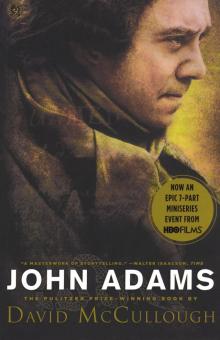 John Adams
John Adams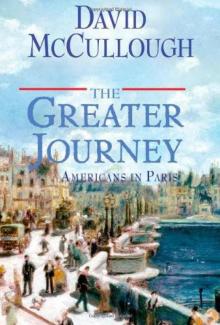 The Greater Journey: Americans in Paris
The Greater Journey: Americans in Paris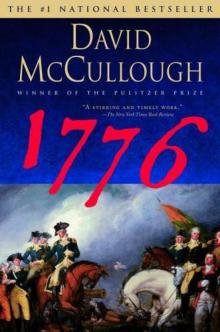 1776
1776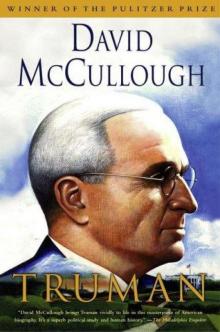 Truman
Truman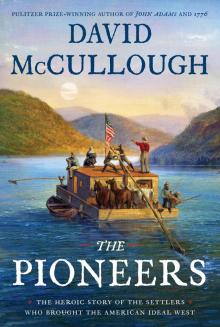 The Pioneers
The Pioneers The Great Bridge: The Epic Story of the Building of the Brooklyn Bridge
The Great Bridge: The Epic Story of the Building of the Brooklyn Bridge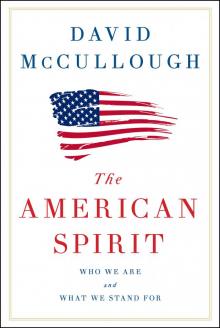 The American Spirit
The American Spirit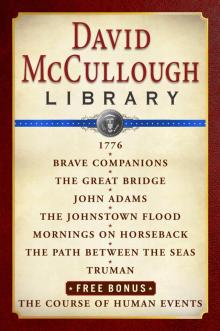 David McCullough Library E-book Box Set
David McCullough Library E-book Box Set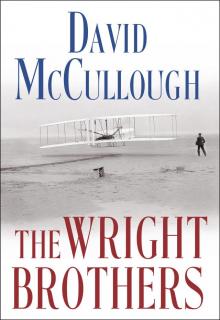 The Wright Brothers
The Wright Brothers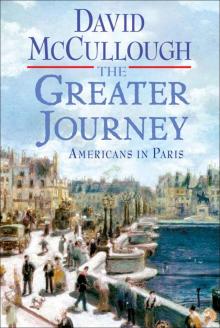 The Greater Journey
The Greater Journey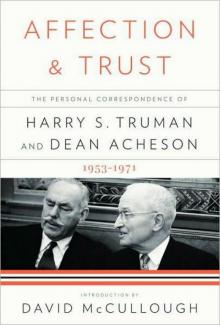 Affection and Trust: The Personal Correspondence of Harry S. Truman and Dean Acheson, 1953-1971
Affection and Trust: The Personal Correspondence of Harry S. Truman and Dean Acheson, 1953-1971 The Great Bridge
The Great Bridge